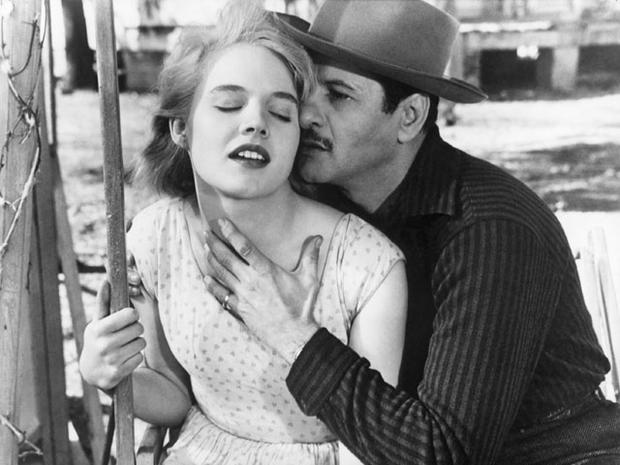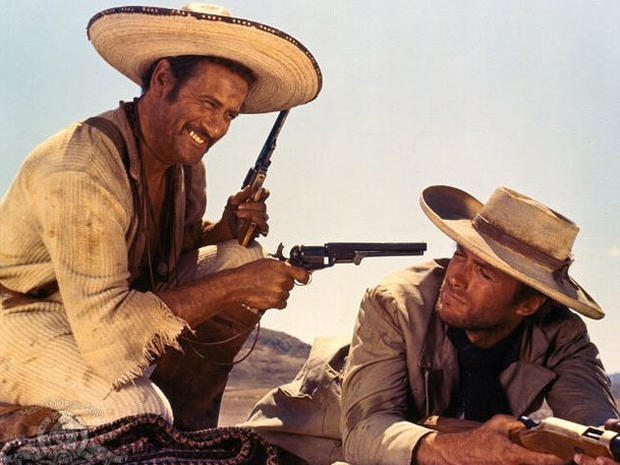Eli Wallach: Still "crazy" after all these years
Actor Eli Wallach steals the scene more than once in the new film "Wall Street: Money Never Sleeps" . . . which is pretty much what he's always done in a career that spans more than half-a-century. This morning he talks to our Tracy Smith:
On the streets of Manhattan, the 94-year-old is greeted with a reverence many actors would kill for.
"How do you like this? Wait till my wife sees this!" said Eli Wallach.
"You're a good man. I liked all your movies!" said one passer-by.
On a brief walk a few days ago, admiring fans stopped Wallach on every corner.
"You got it? Oh, you did it!"
Small wonder: At an age when most actors are long-forgotten, Eli Wallach can still mesmerize.
In "Wall Street: Money Never Sleeps," Wallach is a wise old banker who predicts a financial apocalypse.
The ominous whistle he uses in one scene is actually something Wallach came up with himself, after he forgot the original line.
"The director said, 'Action.' And I said . . . . then I figured I'd better say something. So I leaned forward to the man and I say, 'It's the end of the world, Bill.' And then I put in (whistles). And he came running over and said, 'Keep that in. I want you to have that line in.' And that's what I did for the rest of it."
It's only the latest scene-stealing performance from a man who's had so many it's hard to count.
"Do you keep track of how many roles you've played?" Smith asked.
Wallach just laughed.
An actor since his early teens, Brooklyn-born Eli Wallach did a five-year Army hitch that took him to the heart of Nazi Germany. And when it was over, he headed for Broadway.
He won a Tony Award in 1951 for "The Rose Tattoo," written by his good friend Tennessee Williams.
Two years later, Wallach was cast in another Williams play, "Camino Real," but a lack of funding held up production. And while he waited for the money to come through, he tried out for a big new Burt Lancaster film set on an Army base in Hawaii.
"I auditioned for a job, and I got the job," he said the role in "From Here to Eternity."
"You were supposed to be Maggio?" Smith asked.
"I was Maggio. I got the part."
But then, the play was back on.
"I got the money for the play, and I said, 'I'll do the play,'" Wallach said. "Although I was signed to do the movie."
Wallach's play closed after a few months, while the part of Angelo Maggio went to Frank Sinatra . . . who turned in an Oscar-winning performance.
"Every time Sinatra saw me after that, he'd say, 'Hello, you crazy actor!'" Wallach laughed.
The "crazy actor" got another chance for a big-screen debut, 1956's "Baby Doll." Wallach's performance earned him a British Academy Award and a slew of Hollywood film offers.
But his heart was always in New York City. "I'd go back to Manhattan, and I'd work in Manhattan," he said.
"Always back to Manhattan?' Smith asked.
"Manhattan is an unusual thing," Wallach said.
"You never felt the lure of, you know, California sun and sand?" Smith asked.
"They always have fires!" Wallach said. "Why the hell do I have to go there? No, no, no, no. I never unpacked when I went. I never unpacked."
Still, he became one of Hollywood's most reliable actors. In a testament to his acting skill, Eli Wallach -- the kid from Brooklyn -- made his mark as a Mexican bandit in 1960's "The Magnificent Seven," accent and all.
"I got a letter from the Pope about four months ago, this Pope," Wallach said. "He said, One of my favorite movies is 'The Magnificent Seven.' And I thought, 'I don't understand. I'm a killer in that. I kill people. Why is he so excited about me killing people?'"
"It was a great performance -- even the Pope thought so," said Smith.
"Oh, I was a killer in that one!" he laughed.
He killed, all right! The performance led to even bigger roles, and soon he was rubbing elbows (and other things) with Marilyn Monroe and Clark Gable in "The Misfits."
But Wallach might be best remembered for a Western with a memorable title, and an unforgettable musical score. In "The Good, the Bad and the Ugly," Wallach was "the ugly," he said.
"What was it like making that film?' Smith asked. "Did you actually share a bed with Clint Eastwood?'
"How did you know that?' Wallach replied.
During filming in Spain, the two stars shared an apartment, and, as Eli Wallach tells it, there was only one bed.
"The beds were this wide," he recalled. "So Clint said, 'Which side of the bed you want?' And I thought, 'I don't know.' I was very radical, so I said, 'I'll take the left side.'"
Onscreen, the strange bedfellows made movie history. But after all the shooting was done, Clint Eastwood told Wallach he had bigger plans.
"He said to me, 'I'm not coming back to Italy again anymore,'" Wallach said. "What I'm gonna do is I'm gonna find my own company and I'm gonna direct movies.' And I thought, 'That'll be the day.' And sure enough, it is the day, because he is brilliant in what he does."
In fact, Eastwood directed his old pal in the Oscar-winning film, "Mystic River."
The one constant in Eli Wallach's life is his wife, actress Anne Jackson. The two were married in 1948.
"The first five years we were together, we spent with Tennessee Williams, doing his plays," Wallach said.
"I taught him everything he knows about acting!" Jackson laughed.
When asked what was the secret of their long marriage -- now 62 years -- Wallach said, "I don't know. I didn't want to get divorced. I loved her. And we fight and argue and all this stuff, but we get along."
Next month, the actor will receive an honorary Oscar for the long list of great movie moments he's created.
Eli Wallach is grateful, but all he really wants to do is to make that long list even longer.
"So do you still look forward to getting a good job?' Smith asked.
"Yeah, I wanna work," Wallach said. "Now, I am an old man now. Right? Pearl Harbor Day is my birthday, December the seventh. I was born in 1915. I am now going to be 95 years old. So I have to be careful. I have to keep my energy going. And I have to surprise people and have people say, 'Ooh, he's so old but he's so nice!' And all that.
"That's what I do. I do it!" he laughed.

